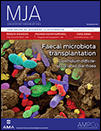Opting for rural practice: the influence of medical student origin, intention and immersion experience
Abstract
Objective: To compare the influence of rural background, rural intent at medical school entry, and Rural Clinical School (RCS) participation on the likelihood of later participation in rural practice.
Design: Analysis of linked data from the Medical School Outcomes Database Commencing Medical Students Questionnaire (CMSQ), routinely collected demographic information, and the Australian Health Practitioner Regulation Agency database on practice location.
Setting and participants: University of Western Australia medical students who completed the CMSQ during 2006–2010 and were practising medicine in 2016.
Main outcome measures: Medical practice in rural areas (ASGC-RAs 2–5) during postgraduate years 2–5.
Results: Full data were available for 508 eligible medical graduates. Rural background (OR, 3.91; 95% CI, 2.12–7.21; P < 0.001) and experience in an RCS (OR, 1.93; 95% CI, 1.05–3.54; P = 0.034) were significant predictors of rural practice in the multivariate analysis of all potential factors. When interactions between intention, origin, and RCS experience were included, RCS participation significantly increased the likelihood of graduates with an initial rural intention practising in a rural location (OR, 3.57; 95% CI, 1.25–10.2; P = 0.017). The effect of RCS participation was not significant if there was no pre-existing intention to practise rurally (OR, 1.38; 95% CI, 0.61–3.16; P = 0.44).
Conclusion: For students who entered medical school with the intention to later work in a rural location, RCS experience was the deciding factor for realising this intention. Background, intent and RCS participation should all be considered if medical schools are to increase the proportion of graduates working rurally.




